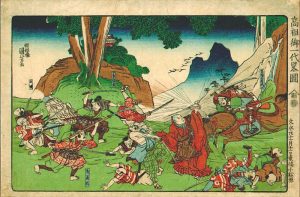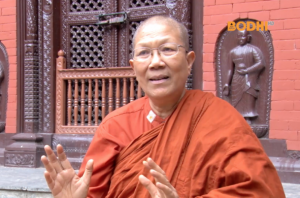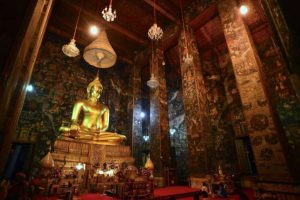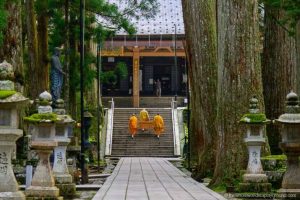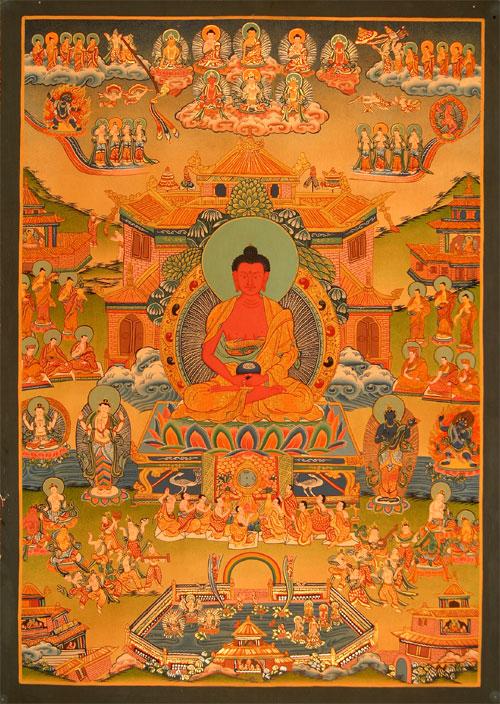
Buddha-invocation signifies reliance on Buddha-power
To attain rebirth in the Land of Bliss, Pure Land practitioners are advised not to mix Amitabha-invocation with other Buddhist practices such as the Three Refuges, Five Precepts, Ten Good Actions, Six Paramitas, and the Eightfold Noble Path. Many Buddhists do not understand when they hear this. It seems to be somewhat extreme to reject other basic or essential Buddhist practices. Nevertheless, this is an important attribute of pristine Pure Land Buddhism. Master Shandao discouraged mixed practices in relation to attaining rebirth in the Land of Bliss.
Buddha-invocation, known as nianfo in Chinese and nembutsu in Japanese, is different from other forms of Buddhist practice. In Buddha-invocation (Amitabha-recitation), practitioners receive merit and virtues dedicated by the Buddhas, called “reliance on Buddha-power,” while in other forms of Buddhism practitioners attain merit and virtues themselves through a variety of practices, which is known as “reliance on self-power.”
How to recognize the Dharma Body and the Body of Compassion of the Buddhas
In my last article, “More about the Correlation between Faith and Practice in Pure Land Buddhism,” I discussed the relationship between faith and practice, and the Three Negations of Faith as stipulated by Master Tanluan (476–542) in his Commentary on the Treatise of Rebirth. Master Tanluan explained that practitioners have the three kinds of crisis in faith when their faith is not aligned with Amitabha-recitation practice. This comes about because they do not recognize the Dharma Body and the Body of Compassion of the Buddhas. What does this mean?
The Contemplation Sutra says that all Buddhas have great compassion. They pursue Buddhahood for the sole purpose of delivering sentient beings unconditionally, thus they dedicate equally all the merit and virtues that they cultivate, thereby benefiting sentient beings in the ten directions. This is what is meant by the Body of Compassion of the Buddhas.
How do sentient beings receive the merit and virtues dedicated by the Buddhas, and obtain the benefits and the fulfillment of their wishes? Master Shandao explained that all Buddhas possess the Dharma Body, which is omnipresent in all the worlds in the ten directions. Whenever and wherever practitioners invoke or recite the name of any Buddha, they will naturally be embraced, without any obstruction, by the Dharma Body of the respective Buddha in the form of light. Subsequently, they receive the Buddha’s dedicated merit and virtues, and obtain the benefits through Buddha-invocation. This is what is meant by the Dharma Body of the Buddhas.
The superiority of the Buddha’s merit compared to the inferiority of ours
It is obvious that the merit and virtues cultivated by the Buddhas and dedicated to sentient beings are real, superior, splendid, wonderful, unsurpassed, and pure because Buddhas are perfectly enlightened with pure karma, and everything is generated from their unflawed mind. The karma of meditative practices such as the Three Studies of Precepts, Meditation, and Wisdom, and non-meditative practices such as the Three Meritorious Deeds, is generated by the flawed minds of ordinary beings and is definitely unreal, inferior, and impure.
In this way, Master Shandao wrote in the Commentary on the Contemplation Sutra that, though called virtuous, other practices cannot be compared to Buddha-invocation. Thus, the Buddha extensively praises the functional power of Buddha-invocation in various passages of the sutras.
For instance, in the Commentary on the Contemplation Sutra, Master Shandao quoted the Avatamsaka Sutra saying that Meghashri Bhikshu told Sudhana, “On the sea of Buddhist dharma Samadhi, I know just one practice, the so-called Samadhi of Buddha-invocation.”* Though it is just one practice, it will prevent one from falling back and getting lost in the cycle of birth and death, even while on the path to Buddhahood. That is why it is called “non-retrogression.”
Pure Land Buddhism is the teaching on Amitabha’s deliverance
With the wish for rebirth in the Land of Bliss, some people may waver between Buddha-power (through the practice of Amitabha-invocation) and self-power (through meditative and non-meditative practices), therefore their practice of Amitabha-recitation is not consistently active, and thus faith is sometimes strong, and sometimes weak, or sometimes even lost. This was discussed in my last article.
Amitabha Buddha is so compassionate that he dedicates his pure and real merit and virtues to Amitabha-reciters, unconditionally delivers them, and receives them all equally in his Pure Land. If, knowing this, Pure Land practitioners continue to seek impure and unreal merits and virtues through meditative and non-meditative practices by self-power, their faith in Amitabha’s deliverance is said not to be genuine or pure, because their Amitabha-recitation practice is sometimes active and sometimes inert.
Conversely, if one has full faith in Buddha-power as the cause for rebirth in the Land of Bliss, one must recite Amitabha’s name as the only practice, without mixing other irrelevant practices that lead to incompatible, yet few, roots of virtue and little merit. This is similar to Master Shandao’s explanation of Sincere Mind in the Commentary on the Contemplation Sutra.
A pristine Pure Land practitioner does not mix Amitabha-recitation practice with other practices with the aim of being reborn in the Land of Bliss. This shows that he has abandoned any bodhisattva practices involving cultivation in self-nature of mind (i.e. enlightenment through self-power), but relies entirely on Amitabha’s power, the essential cause of rebirth in the Land of Bliss (other-power).
* Translation by the author
For more information, see:
More about the Correlation between Faith and Practice in Pure Land Buddhism




